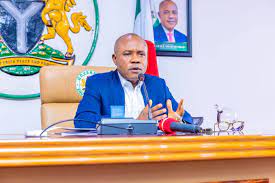The Lagos Chamber of Commerce and Industry (LCCI) has called on the federal government to replace existing debt stocks with asset-linked debt to ease the debt servicing burden.
This is to attract greenfield Foreign Direct Investment (FDI) into publicly-listed state-owned companies; generate new revenue streams from commercialized real estate portfolios.
They observed that Nigeria’s fiscal and financial challenges have been of concern to several stakeholders including the LCCI.
The government has increasingly resorted to debt to finance recurrent and capital obligations in the face of dwindling revenue.
The country’s debt situation has become worrisome with debt servicing consuming a significant share of the revenue.
The debt service to revenue ratio for the period of January to May 2021 stood at about 98 per cent up from 83 per cent recorded in 2020 according to the budget implementation report.
They said that Nigeria is an asset-rich nation owning hundreds of large state-owned companies, valuable parcels of land, and built structures in prime commercial locations. These assets are grossly underutilized and contribute too little to the country’s fiscal and financial situation because their market values are currently not known.
They noted that there is, therefore, a need for government to take urgent steps to establish the market values of the assets, securitize the corporate assets and commercialize the real estate assets to raise revenue for the government and foreign exchange inflows for the country.
The Chamber therefore proposed to the Government at both federal and state levels to identify its assets in terms of location, purpose, and usage contained in a national asset register.
According to them there are four types of assets namely: Corporate assets – such as refineries, state-owned enterprises. Physical assets- such as government land and built structures. Intangible assets – such as the GSM licensing and pension funds Human capital – a national pool of high-return skills.
In their thinking an asset register that provides detailed information about Nigeria’s assets at national, state, and local government levels must be created.



